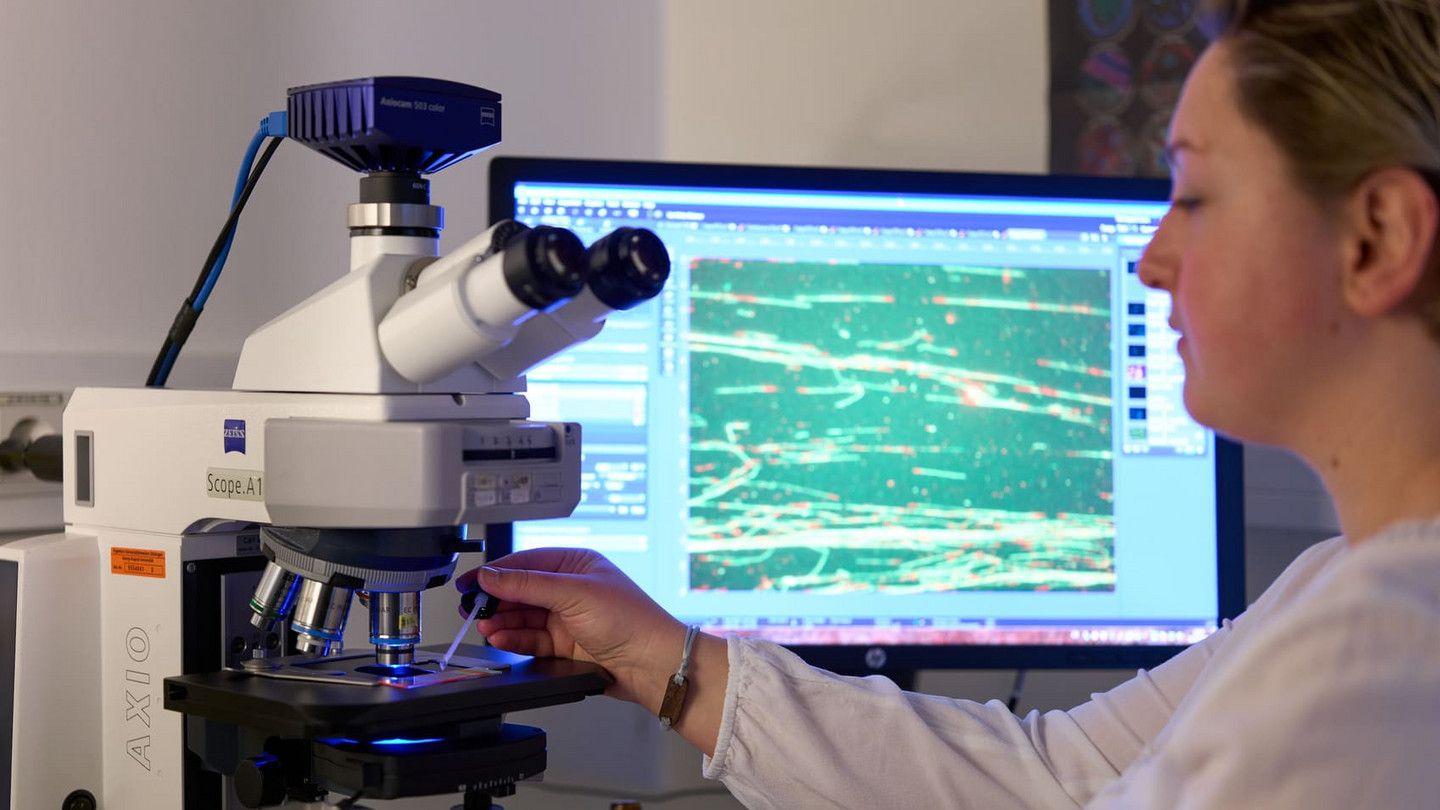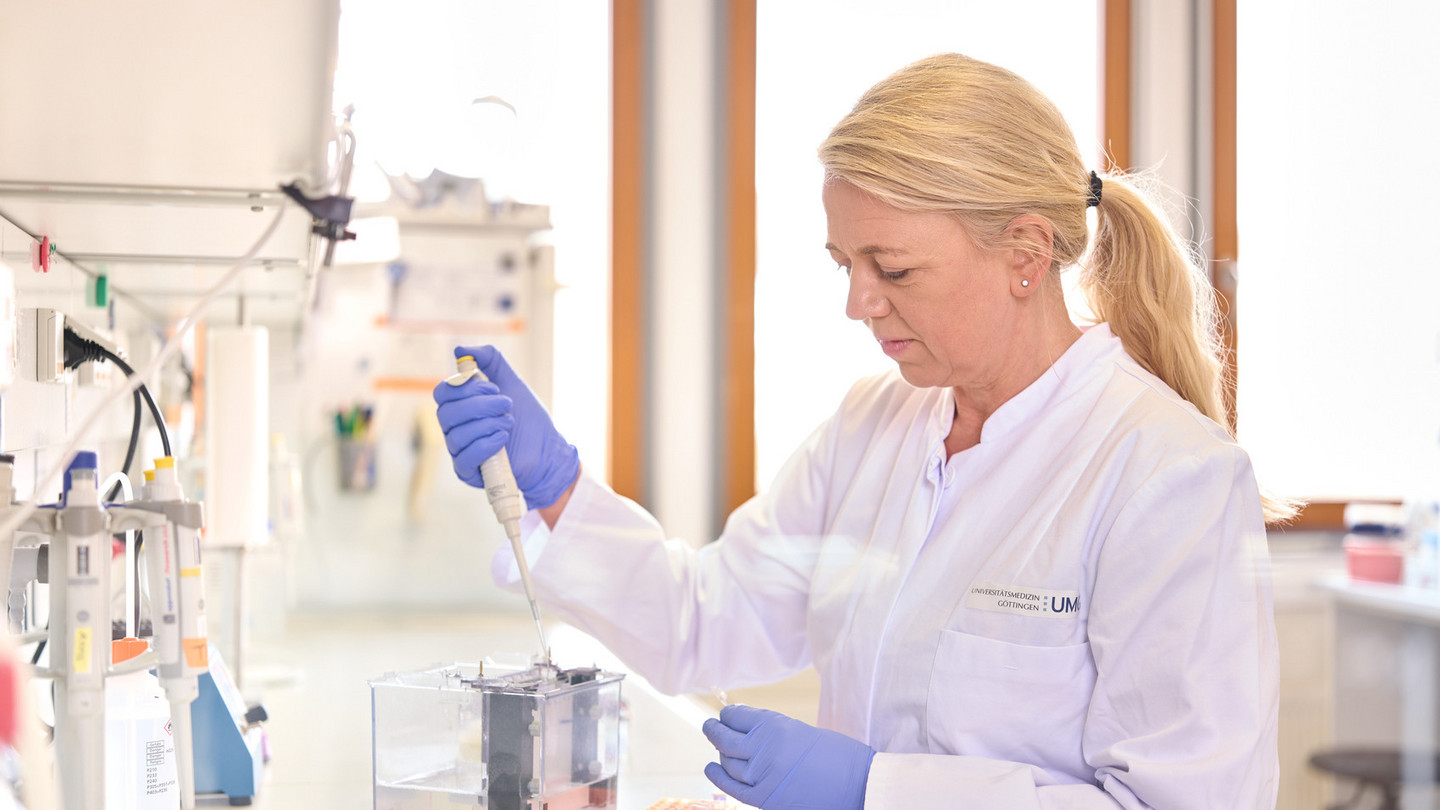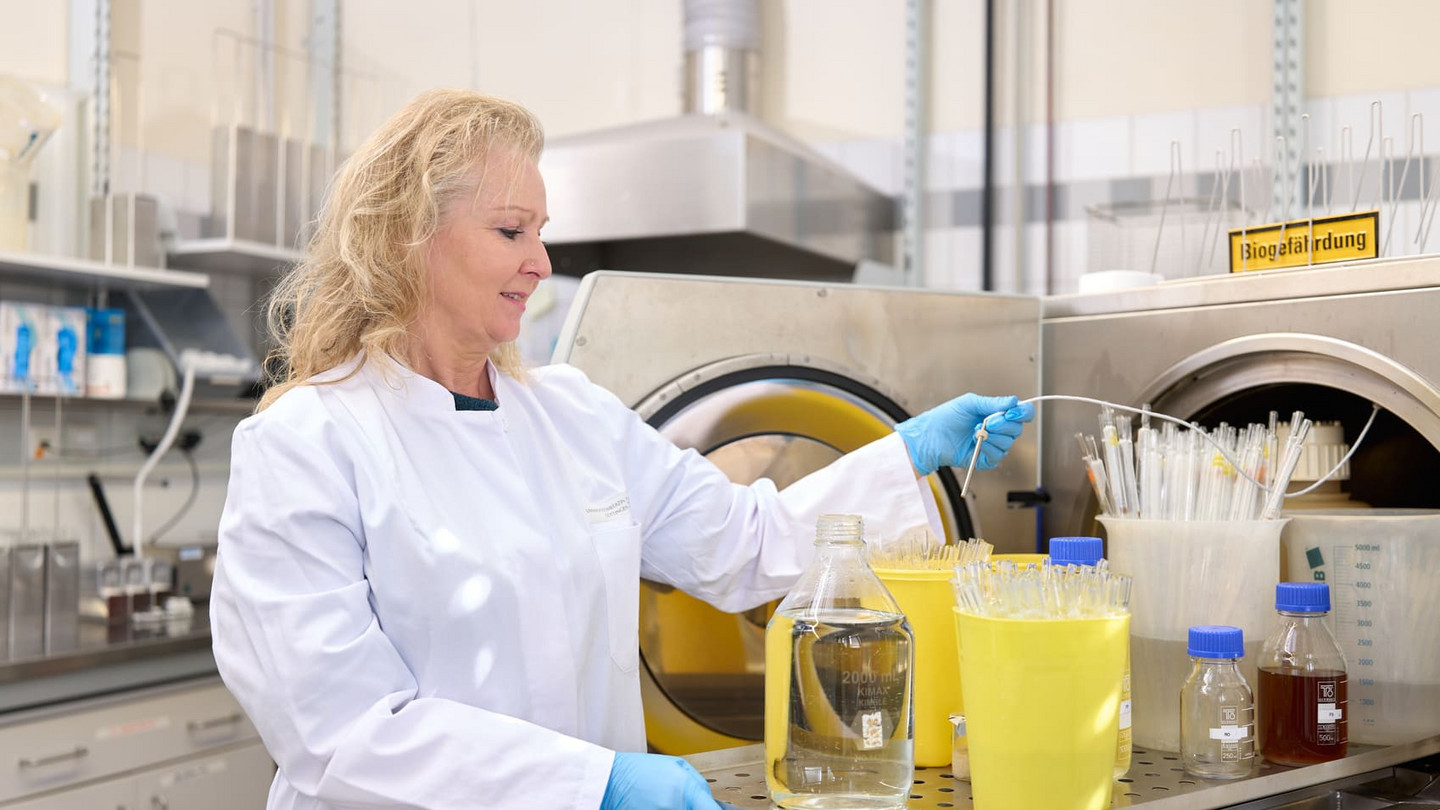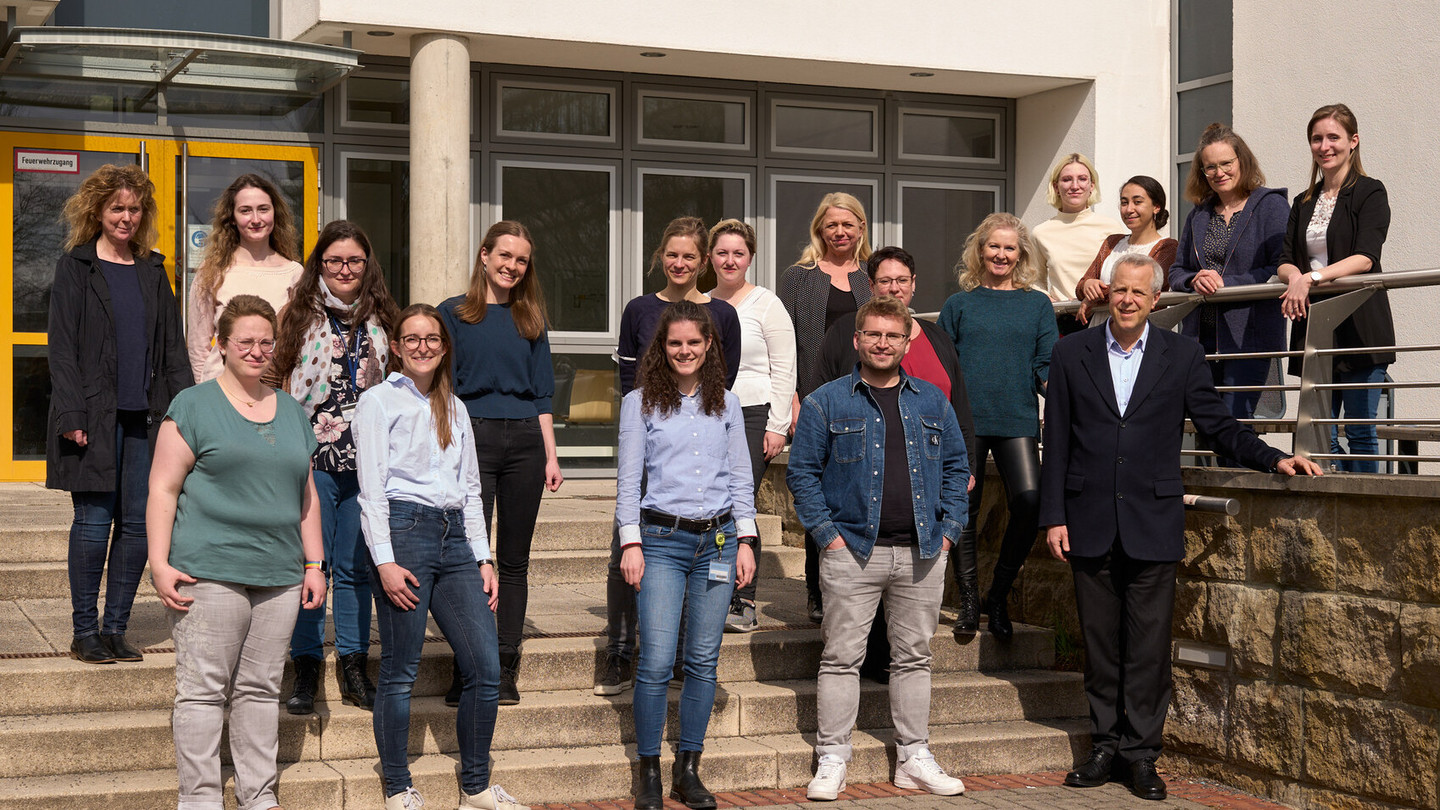Our group is studying the tumor suppressor p53 and its antagonist MDM2. The MDM2 oncoprotein affects cancer cell growth in multiple ways, and we strive to understand how this works.
Exploring the mechanisms of cancer chemotherapy, we began to analyze how chemotherapeutics affect virus replication. This led us to a new area of our research, the pharmacotherapy of virus infections.
Our research is supported by membership of the PI in the following consortia.
- Fellow at the Max Planck Institute for Multidisciplinary Sciences, MPI-NAT, https://www.mpinat.mpg.de/dobbelstein
- Faculty member at the Göttingen Graduate Center for Neurosciences, Biophysics, and molecular Biosciences, GGNB, as well as the MSc/PhD programs in Molecular Biology and Molecular Medicine https://www.uni-goettingen.de/de/57931.html
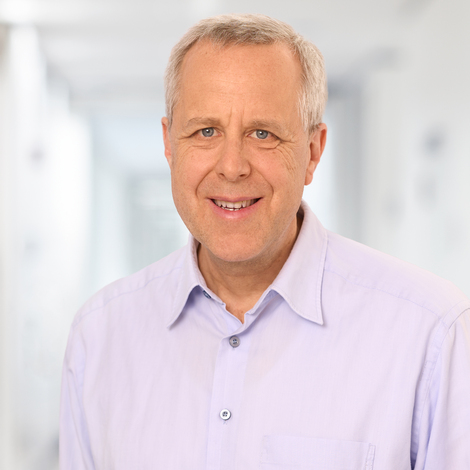
contact information
- telephone: +49 551 3960757
- fax: +49 551 3960747
- e-mail address: mdobbel(at)uni-goettingen.de
Address
Robert-Koch-Straße 40
37075 Göttingen
Research topics
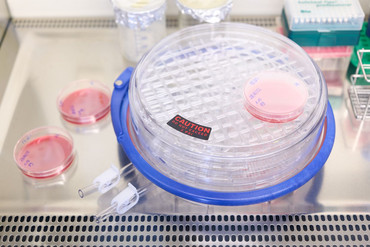
The tumor suppressor p53 is mutated in more than 50% of all human cancers, and that’s the world record among tumor-associated mutations. Its product, the p53 protein, is a transcription factor. It mostly induces genes that keep the cell from proliferating or make the cell die. To counterbalance these activities, p53 also induces the expression of its own antagonist, the MDM2 oncoprotein. MDM2 binds and ubiquitinates p53.
Our group is exploring the activities of MDM2. To our own surprise, it turned out that MDM2 carries out multiple functions in the cell, on top of its negative feedback on p53. MDM2 is a chromatin modifier, MDM2 enhances the progression of DNA replication forks, and MDM2 binds to a multitude of interaction partners on top of p53. The list of such additional activities is getting longer, and our aim is to put these activities into an integrated model of how MDM2 acts as an effector, not just a regulator of p53-mediated tumor suppression.
During the COVID-19 pandemics, we have built an additional research line on the biology of infections. We are focusing on potential therapeutics against virus infections, such as nucleoside analogues that interfere with the replication of SARS-CoV-2, or camelid-derived antibodies to block virus entry. To carry out these research activities, we are collaborating with the following institutions.
- Max Planck Institute for Multidisciplinary Sciences, MPI-NAT
- German Primate Research Center
- Institute of Medical Microbiology and Virology at UMG
- Friedrich Loeffler Institut, Insel Riems, Greifswald
Principle Investigator

Education
- 1986 - 1992: Studies of Human Medicine, Munich University (LMU)
Degrees
- 2011 - present: Professor (W3) of Molecular Oncology, UMG
- 2005 - 2011: Professor (W2 tenure track) of Molecular Oncology, UMG
- 2002: Habilitation in Virology, Philipps University Marburg
- 1994: Dr. med. (summa cum laude), Tumor Virology, Munich University
Professional Career
- 2005 - present: Director, Institute of Molecular Oncology, UMG
- 2004 - 2005: Professor of Molecular Oncology, Medical Biotechnology Center, University of Southern Denmark, Odense, Denmark
- 1997 - 2004: Group Leader, Institute of Virology, Philipps University Marburg
- 1993 - 1996: Postdoctoral Research Fellow with Prof. Dr. T. Shenk, Virology, Department of Molecular Biology, Princeton University, NJ (USA)
- 1992: Full approbation as physician, LMU Munich
Honors, awards and stipends
- Since 2020: Associated member, Max Planck Institute of Biophysical Chemistry
- Since 2015: Spokesperson of three Clinician Scientist Colleges, funded by DFG, Ministry of Science Lower Saxony, and Else Kröner-Fresenius Stiftung
- Since 2015: Spokesperson of the Promotionskolleg for research projects run by students at the medical school, funded by the EKFS
- 2007: Award „Lecturer of the Year”, Molecular Medicine Master Program
- 1999: Postdoctoral Award for Virus Research, Robert Koch Foundation
- 1998: Research Award, Hessian Cancer Society
- 1993 - 1996: Scholarship Infectious Biology (AIDS scholarship), German Cancer Research Center Heidelberg
- 1986 - 1992: Stipendium nach dem Bayerischen Begabtenförderungsgesetz
- 1986 - 1992: Stipendium der Studienstiftung des deutschen Volkes
Publications
Recent publications from our group can be found here:
https://pubmed.ncbi.nlm.nih.gov/?term=dobbelstein+m&sort=date&size=200&show_snippets=off .
Selected publications:
- Jansen J, Bohnsack KE, Böhlken-Fascher S, Bohnsack MT, Dobbelstein M (2024) The ribosomal protein L22 binds the MDM4 pre-mRNA and promotes exon skipping to activate p53 upon nucleolar stress. Cell Rep. 2024 Aug 6;43(8):114610. doi: 10.1016/j.celrep.2024.114610. Online ahead of print. PMID: 39116201
- Aksu M, Kumar P, Güttler T, Taxer W, Gregor K, Mußil B, Rymarenko O, Stegmann KM, Dickmanns A, Gerber S, Reineking W, Schulz C, Henneck T, Mohamed A, Pohlmann G, Ramazanoglu M, Mese K, Groß U, Ben-Yedidia T, Ovadia O, Fischer DW, Kamensky M, Reichman A, Baumgärtner W, von Köckritz-Blickwede M, Dobbelstein M, Görlich D. (2024) Nanobodies to multiple spike variants and inhalation of nanobody-containing aerosols neutralize SARS-CoV-2 in cell culture and hamsters. Antiviral Res. 2024 Jan;221:105778. doi: 10.1016/j.antiviral.2023.105778. Epub 2023 Dec 7. PMID: 38065245
- Zibat A, Zhang X, Dickmanns A, Stegmann KM, Dobbelstein AW, Alachram H, Soliwoda R, Salinas G, Groß U, Görlich D, Kschischo M, Wollnik B, Dobbelstein M (2023) N4-hydroxycytidine, the active compound of Molnupiravir, promotes SARS-CoV-2 mutagenesis and escape from a neutralizing nanobody. iScience. 2023 Aug 30;26(10):107786. doi: 10.1016/j.isci.2023.107786. eCollection 2023 Oct 20. PMID: 37731621
- Solvie D, Baluapuri A, Uhl L, Fleischhauer D, Endres T, Papadopoulos D, Aziba A, Gaballa A, Mikicic I, Isaakova E, Giansanti C, Jansen J, Jungblut M, Klein T, Schülein-Völk C, Maric H, Doose S, Sauer M, Beli P, Rosenwald A, Dobbelstein M, Wolf E, Eilers M. (2022) MYC multimers shield stalled replication forks from RNA polymerase. Nature. 612:148-155; PMID: 36424410
- Giansanti C, Manzini V, Dickmanns An, Dickmanns Ac, Palumbieri MD, Sanchi A, Kienle SM, Rieth S, Scheffner M, Lopes M, Dobbelstein M (2022). MDM2 binds and ubiquitinates PARP1 to enhance DNA replication fork progression. Cell Reports, 39(9):110879
- Stegmann KM, Dickmanns A, Heinen N, Blaurock C, Karrasch T, Breithaupt A, Klopfleisch R, Uhlig N, Eberlein V, Issmail L, Herrmann ST, SchreieckA, Peelen E, Kohlhof H, Sadeghi B, Riek A, Speakman JR, Groß U, Görlich D, Vitt D, Müller T, Grunwald T, Pfaender S, Balkema-Buschmann A, and Dobbelstein M. (2022) Inhibitors of dihydroorotate dehydrogenase cooperate with Molnupiravir and N4-hydroxycytidine to suppress SARS-CoV-2 replication. iScience 10.1016/j.isci.2022.104293
- Güttler T, Aksu M, Dickmanns A, Stegmann KM, Gregor K, Rees R, Taxer W, Rymarenko O, Schünemann J, Dienemann C, Gunkel P, Mussil B, Krull J, Teichmann U, Groß U, Cordes VC, Dobbelstein M*, Görlich D*. (2021) Neutralization of SARS-CoV-2 by highly potent, hyperthermostable, and mutation-tolerant nanobodies. EMBO J e10798 *co-corresponding authors
- Stegmann KM, Dickmanns A, Gerber S, Nikolova V, Klemke L, Manzini V, Schlösser D, Bierwirth C, Freund J, Sitte M, Lugert R, Salinas G, Görlich D, Wollnik B, Groß U and Dobbelstein M. (2020) The folate antagonist methotrexate diminishes replication of the coronavirus SARS-CoV-2 and enhances the antiviral efficacy of remdesivir in cell culture models. Virus Research 302 (2021) 198469
- Klusmann I, Wohlberedt K, Magerhans A, Teloni F, Korbel JO, Altmeyer M, Dobbelstein M (2018) Chromatin modifiers Mdm2 and RNF2 prevent RNA:DNA hybrids that impair DNA replication. Proc Natl Acad Sci U S A. 115(48):E11311-E11320
- Schulz-Heddergott R, Stark N, Edmunds SJ, Li J, Conradi LC, Bohnenberger H, Ceteci F, Greten FR, Dobbelstein M*, Moll UM* (2018) Therapeutic Ablation of Gain-of-Function Mutant p53 in Colorectal Cancer Inhibits Stat3-Mediated Tumor Growth and Invasion. Cancer Cell. 34(2):298-314
- Klusmann I, Rodewald S, Müller L, Friedrich M, Wienken M, Li Y, Schulz-Heddergott R, Dobbelstein M (2016) p53 Activity Results in DNA Replication Fork Processivity. Cell Reports 17(7):1845-1857
- Wienken M, Dickmanns A, Nemajerova A, Kramer D, Najafova Z, Weiss M, Karpiuk O, Kassem M, Zhang Y, Lozano G, Johnsen SA, Moll UM, Zhang X, Dobbelstein M (2015) MDM2 Associates with Polycomb Repressor Complex 2 and Enhances Stemness-Promoting Chromatin Modifications Independent of p53. Molecular Cell. 2016 61(1):68-83.
- Zhang X, Schulz R, Edmunds S, Krüger E, Markert E, Gaedcke J, Cormet-Boyaka E, Ghadimi M, Beissbarth T, Levine AJ, Moll UM, Dobbelstein M (2015) MicroRNA-101 Suppresses Tumor Cell Proliferation by Acting as an Endogenous Proteasome Inhibitor via Targeting the Proteasome Assembly Factor POMP. Molecular Cell 59(2):243-57
- Dobbelstein M and Sørensen CS (2015) Exploiting replicative stress to treat cancer. Nat Rev Drug Discov 14(6):405-23
- Dobbelstein M and Moll U (2014) Targeting tumour-supportive cellular machineries in anticancer drug development. Nat Rev Drug Discov 13(3):179-96
Funding
| Title | Agency | Duration |
|---|---|---|
| SP7: Exploiting subtype-specific HSP90 targeting for sensitization of PDAC cells towards platinum-based therapy | DFG, KFO 5002** | 2020-2024 2024-2028 |
| CP1: Translational platform for PDAC models and drug response validation | DFG, KFO 5002** | 2020-2024 2024-2028 |
| Nanobodies to ACE2 for prevention and therapy of SARS-CoV-2 infection | Volkswagen Stiftung | 2025-2027 |
| Synergistic inhibition of SARS-CoV-2 replication by pyrimidine analogues and inhibitors of pyrimidine synthesis | COFONI – Corona Forschungs Netzwerk Niedersachsen | 2022-2025 |
| Synergistically targeting pyrimidine metabolism and RNA integrity for the treatment of respiratory diseases caused by zoonotic influenza A viruses and henipaviruses | Volkswagen Stiftung | 2022-2025 |
| Influence of perturbed ribosome | DFG SFB*** | 2023-2026 |
| Understanding and exploiting adaptation to asparagine deprivation in GI cancer | GRK | 2025-2028 |
* For further information regarding EFRE see https://molonc.umg.eu/research/dobbelstein-lab/silab/
*** For further information regarding DFG SFB see https://sfb1565.uni-goettingen.de/
** For further information regarding KFO see https://gccc.umg.eu/kfo5002/

